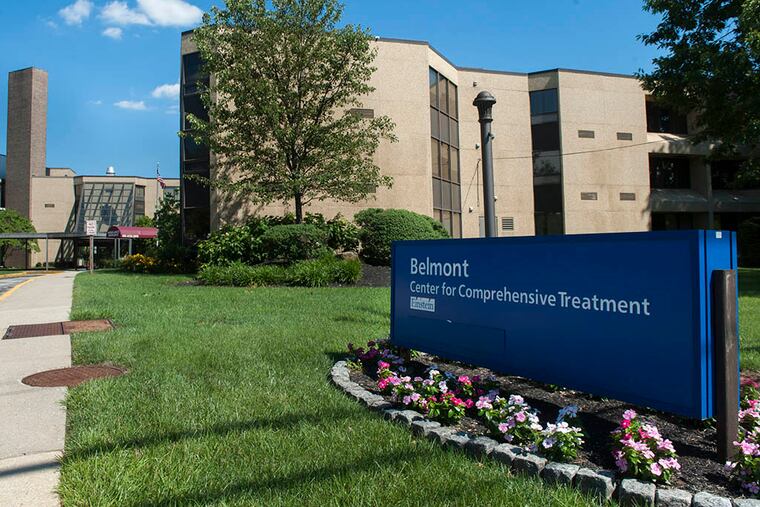With acquisition, Acadia Healthcare expects to expand Belmont Center
When Acadia Healthcare Co. Inc. buys Philadelphia's Belmont Center for Comprehensive Treatment in a $35 million deal expected to close June 30, don't expect the Tennessee company to stand pat.

When Acadia Healthcare Co. Inc. buys Philadelphia's Belmont Center for Comprehensive Treatment in a $35 million deal expected to close June 30, don't expect the Tennessee company to stand pat.
"This is a facility that needs immediate expansion because of the demand for services," Acadia chairman and chief executive Joey A. Jacobs said this month at an investors conference.
Einstein Healthcare Network is selling the 147-bed Belmont Center, which had an operating loss of $1.9 million on $38 million in revenue in the year ended June 30, 2014.
Acadia is the nation's second-biggest operator of psychiatric hospitals. The biggest, Universal Health Services Inc., based in King of Prussia, has also been telling investors at every opportunity about the need for more beds.
"Honestly, if we could snap our fingers or I could snap my fingers, we'd probably add a couple thousand beds tomorrow. We think there is that much demand," said Steve Filton, UHS's chief financial officer.
In 2014, UHS added 500 beds to existing facilities, finishing the year with 20,037 psychiatric beds at 182 facilities in the United States, including 1,171 at seven facilities in the Philadelphia region.
Acadia, which has about 9,000 beds, including acquisitions this year, and UHS are making money handily from behavioral health. Acadia had a 19 percent operating profit margin last year on $1 billion in revenue.
UHS's behavioral-health facilities, which had $3.9 billion in net revenue last year, had a 21 percent pretax profit margin, compared with a pretax margin of 7 percent at its general acute-care hospitals.
"The supply-demand dynamics in the inpatient behavioral-health industry right now are about as good as in any subsector of health care," said A.J. Rice, a managing director in equity research at UBS Securities L.L.C. who follows Arcadia and UHS.
The number of beds in the psychiatric units of acute-care hospitals and in freestanding psychiatric facilities fell by a third between 1995 and 2013, from 160,645, to 107,055 the American Hospital Association said.
Experts attributed the decline in psychiatric beds to the broad shift in emphasis in mental-health care from institutionalization to community-based care, as well as a 1990s crackdown on inpatient psychiatric care by managed-care companies that made it hard for providers to make money.
Political and social forces have turned the tide in favor of hospitals for people with mental illnesses, such as depression and schizophrenia.
Two federal laws since 2008 have significantly expanded insurance coverage for mental-health care, and the social stigma of seeking psychiatric care has lessened. But not all reasons for the increasing psychiatric-bed demand are positive, experts said.
"There's also a lack of outpatient services," said Steven S. Sharfstein, president and chief executive of Sheppard Pratt Health System, a large nonprofit behavioral-health provider in Baltimore. "If there were better outpatient services, there would be less need for beds."
Meanwhile, the Centers for Medicare and Medicaid Services are considering adding to Acadia and UHS' pool of potential patients with a new rule that would allow companies that manage Medicaid benefits to send adults to freestanding mental hospitals.
For decades, Medicaid has restricted adult beneficiaries to the psychiatric units of general hospitals, to prevent institutionalization of the mentally ill.
"We know those patients are there; we're just not able to capture them right now from a reimbursement standpoint," Brent Turner, Acadia's president, told investors at the June 2 conference. If the final rule favors Acadia, "we are comfortable that it's another tailwind for volume growth," he said.
Turner and Jacobs, Acadia's CEO, are familiar with the Philadelphia market. They led the management of Psychiatric Solutions Inc., which owned Friends Hospital in Philadelphia and Brooke Glen Behavioral Hospital in Fort Washington.
UHS bought Psychiatric Solutions in 2010 for $1.96 billion, plus the assumption of $1.15 billion in debt.
In early 2011, Jacobs and Turner moved over to Acadia, which they have built through a string of acquisitions, with Belmont Center, on Monument Road in West Philadelphia, being a rare purchase of a single site.
Acadia has not disclosed specific plans for Belmont Center, but a spokesman said adding beds is a key part of Acadia's strategy.
"We want the beds there when they are needed, before they are needed," Scott Brittain said.
215-854-4651@InqBrubaker